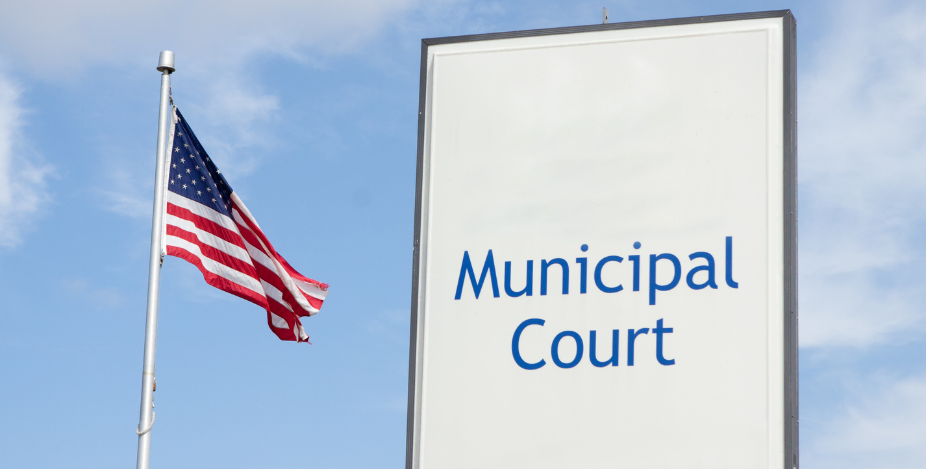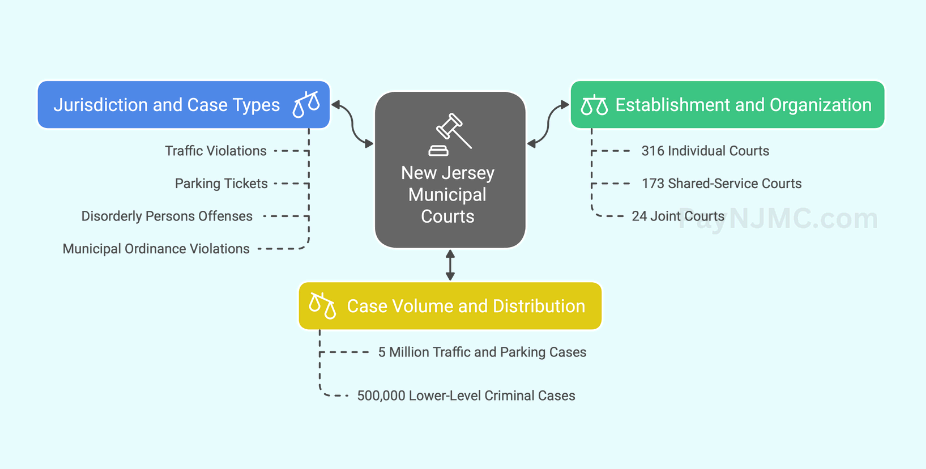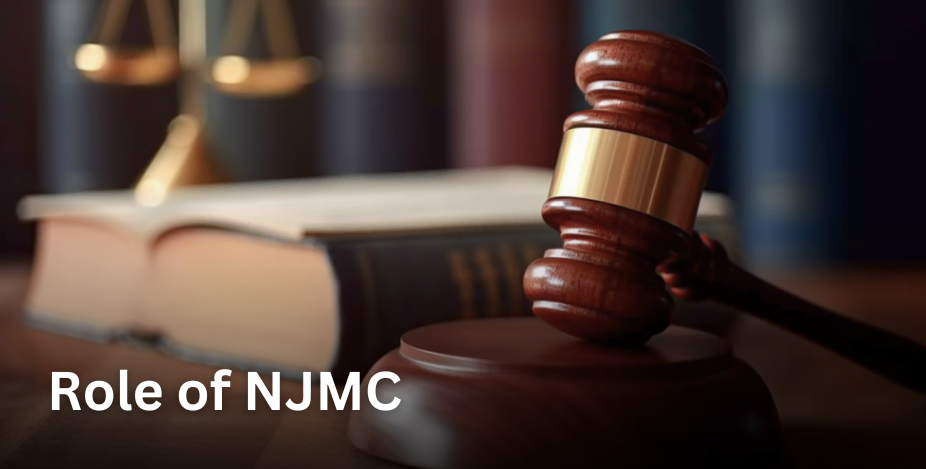Most people first meet the law in the New Jersey Municipal Court (NJMC) System. These local courts see about 6 million cases yearly involving speeding tickets or minor crimes. If you ever get a traffic violation or break a local law, you’ll probably end up at one. We’ll explain how these courts work so you know what to expect.
| Quick Facts | Details |
| Number of Courts | 515 |
| Cases per Year | ~6 million |
| Main Case Types | Traffic violations, parking offenses, disorderly persons offenses |
| Appointment of Judges | By mayors and town councils for 3-year terms |
| Online Services | NJMCdirect.com for payments and scheduling |

Structure and Jurisdiction of New Jersey Municipal CourtS
The New Jersey municipal court jurisdiction limits are set by state law. These courts handle the everyday stuff that can land you in hot water.
Establishment and Organization
New Jersey has set up a network of local courts to serve its communities:
- 316 individual courts
- 173 shared-service courts
- 24 joint courts
Establishing joint municipal courts in NJ is a smart move. It’s like carpooling but for justice. Towns team up to share costs and resources, making things smoother for everyone.
Jurisdiction and Case Types
When it comes to municipal court case types in New Jersey, here’s what you might face:
- Traffic violations (but not DUIs)
- Parking tickets
- Disorderly persons offenses (like simple assault or shoplifting)
- Petty disorderly persons offenses (think: disorderly conduct)
- Municipal ordinance violations (local laws about noise, pets, etc.)
- DWI cases
You’ll likely end up here if you’re caught speeding or get into a bar fight.
Case Volume and Distribution
These courts are busy places:
- About 5 million traffic and parking cases
- Over 500,000 lower-level criminal cases
That’s a lot of tickets and minor offenses!

Administration and Judicial Appointments
Court Administration
Each court is like a mini-justice system. It has its own judges, prosecutors, public defenders, and staff. The Administrative Office of the Courts monitors the system and ensures everyone plays by the rules.
Judicial Appointment Process
The municipal court judge appointment process in NJ works like this:
- Mayors and town councils pick the judges
- Judges serve for 3-year terms
Some people worry judges are chosen for political connections rather than skill. There’s talk of reforming the selection process to make it more fair and independent.
Challenges and Reform Efforts
Revenue Generation Concerns
Here’s where things get tricky. Municipal courts bring in big bucks for towns. In 2017, they collected over $400 million, with more than half going to local coffers. It’s like the courts are ATMs for the towns. This raises a big question: Are courts more focused on making money than justice?
Reform Initiatives
The big cheeses at the Supreme Court are on the case. They’ve set up a committee to look at how things work. They’re focusing on:
- Cutting down on hefty fines that hit people hard in the wallet
- Not using bench warrants and license suspensions to collect money
- Fixing how judges decide on contempt charges
The goal? To ensure everyone gets a fair shake, regardless of how much money they have.
Technological Advancements
Courts are getting with the times:
- You can pay fines online through NJMCdirect.com
- Virtual court hearings became a thing during COVID-19
- Reschedule your court date with a few clicks
- Fill out court forms online
It’s like the courts are finally catching up to the 21st century!
Impact on New Jersey Residents
Public Perception and Access to Justice
For many people, local court is our first brush with the law. These courts must be fair and precise since they shape public trust. If citizens think the system favors certain groups, it hurts everyone.
Alternative Dispute Resolution
Some courts offer a confidential, structured, non-adversarial process to settle disputes. It’s like having a referee help you and the other person work things out without all the courtroom drama. This can be a great way to solve problems without getting tangled up in legal jargon.
Ongoing Reform Efforts
The New Jersey Municipal Court System is changing:
- They’re working on making things fairer and more efficient
- There’s a push to make sure judges are picked based on skill, not who they know
The goal is to have a system that works for everyone, not just those with deep pockets or political connections.
Technological Integration
Get ready for more online options:
- Virtual courts might become the new normal
- More services will move online to make your life easier
Imagine handling your court business from your couch. We’re not quite there yet, but we’re heading that way.
Community-Focused Justice
The big idea is to balance what local towns need with fair treatment for everyone. They’re looking at new ways to handle sentences, like community service programs. Instead of just slapping people with fines, courts might find ways to help folks make amends that actually benefit the community.
If you end up in municipal court, don’t stress. Use online help, know your rights, and ask for help. These courts exist to serve you. With changes coming, your court trip (if you ever have one) could go smoother than expected.

